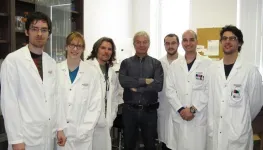(Press-News.org) CABI-led Plantwise plant clinics can help promote more sustainable ways to fight crop pests and diseases in Rwanda and Zambia - such as the fall armyworm - with the judicial use of pesticides within Integrated Pest Management (IPM) plans.
Dr Justice Tambo, lead author of the study published in the journal Food Policy, surveyed 1,474 farm households in Rwanda and Zambia and found that although farmers who visit plant clinics show a higher probability of opting for pesticides for pest control, they do not use them intensively and are more likely to adopt safer and more sustainable alternatives.
The scientists, which include researchers from the Rwanda Agriculture and Animal Resources Development Board (RAB) and the Zambia Agriculture Research Institute (ZARI), also revealed that plant clinic users are significantly more likely than non-users to wear protective clothing while working with pesticides.
Crop pests are a major limiting factor of agricultural productivity growth worldwide and in Sub-Saharan Africa, in particular, crop losses due to pests are predicted to be between 40% to 60%. The fall armyworm, for example, was confirmed on the continent in 2016 and has the potential to cause annual maize losses of about 8 to 20 million tonnes in just 12 countries.
Dr Tambo said, "In this study, we investigated whether plant clinics can enhance rational use of pesticides, in terms of reduced use of highly toxic or banned pesticides, adoption of alternative and environmentally friendly pest management practices, proper disposal of pesticide wastes, use of personal protective equipment (PPE), and the implications for incidence of pesticide-related ill-health.
"The IPM paradigm aims to reduce reliance on pesticides by encouraging the use of a combination of sustainable pest control practices. IPM techniques include judicious use of pesticides, as well as non-chemical pest management practices, such as intensive monitoring, resistant varieties, cultural control, physical or mechanical control and biological control."
Plant clinics, which are set up at public places such as markets and village centres, allow any farmer to bring a sample of any 'sick' crop where a plant doctor will be able to identify, diagnose and recommend treatment for the farmer to consider.
In collaboration with national partners, the Plantwise programme has established about 4,500 plant clinics in 34 countries across Africa, Asia and Latin America. In Rwanda, there are 66 active plant clinics that are manned by 230 trained plant doctors. Similarly, Zambia has 121 plant clinics that are staffed by 352 plant doctors.
At the time of this study, these plant clinics had attended to 16,130 and 12,000 farmers' queries on about 100 crops in Rwanda and Zambia respectively, signifying their growing popularity and importance as a source of plant health information.
Mr Mathews Matimelo, of ZARI, said, "Pesticides can provide rapid means of controlling pests and prevent crop losses, but they can also pose a major risk to humans, animals and the environment, if not used judiciously.
"Plant clinic users are more likely than non-users to use pesticides in combination with other non-chemical methods of pest control, including cultural and physical methods such as crop rotation and handpicking of egg masses and larvae.
"In particular, our impact estimates indicated that clinic users adopt significantly more FAW management options than their matched non-clinic user counterparts - 15% and 20% more in Zambia and Rwanda, respectively."
The researchers conclude that the plant clinic extension approach would benefit from scaling so as to promote IPM adoption in smallholder agriculture.
In addition, they suggest that further training could be given to the small percentage of farmers to help them steer clear of banned, restricted or wrong pesticides as well as the proper use of PPE.
INFORMATION:
Full paper reference
Justice A. Tambo, Dannie Romney, Idah Mugambi, Fredrick Mbugua, Mary Bundi, Bellancile Uzayisenga, Mathews Matimelo and Mathias Ndhlovu, 'Can Plant Clinics Enhance Judicious Use of Pesticides? Evidence from Rwanda and Zambia,' 22 March 2021, Food Policy, DOI: 10.1016/j.foodpol.2021.102073
The paper can be viewed open access here:
https://doi.org/10.1016/j.foodpol.2021.102073
Denver--March 26, 2021---A lymph node collection kit can help surgeons attain compete resection and improve long-term survival after curative-intent lung cancer surgery, according to a study published in the Journal of Thoracic Oncology Clinical and Research Reports. The journal is published by the International Association for the Study of Lung Cancer.
Surgical resection is the most important curative treatment for non-small cell lung cancer (NSCLC). With successful implementation of lung cancer screening programs, the proportion of patients with NSCLC who undergo surgery is likely to increase significantly.
"However, poor surgical quality reduces the survival benefit of curative-intent surgery and suboptimal ...
The discovery of the material graphene, which consists of only one layer of carbon atoms, was the starting signal for a global race: Today, so-called "2D materials" are produced, made of different types of atoms. Atomically thin layers that often have very special material properties not found in conventional, thicker materials.
Now another chapter is being added to this field of research: If two such 2D layers are stacked at the right angle, even more new possibilities arise. The way in which the atoms of the two layers interact creates intricate geometric patterns, and these patterns have a decisive impact on the material properties, as a research team from TU Wien and the University of Texas ...
The possibly oldest cephalopods in the earth's history stem from the Avalon Peninsula in Newfoundland (Canada). They were discovered by earth scientists from Heidelberg University. The 522 million-year-old fossils could turn out to be the first known form of these highly evolved invertebrate organisms, whose living descendants today include species such as the cuttlefish, octopus and nautilus. In that case, the find would indicate that the cephalopods evolved about 30 million years earlier than has been assumed.
"If they should actually be cephalopods, we would have to backdate the origin of cephalopods into the early Cambrian period," says Dr Anne Hildenbrand ...
Russian scientists have proposed a new algorithm for automatic decoding and interpreting the decoder weights, which can be used both in brain-computer interfaces and in fundamental research. The results of the study were published in the Journal of Neural Engineering.
Brain-computer interfaces are needed to create robotic prostheses and neuroimplants, rehabilitation simulators, and devices that can be controlled by the power of thought. These devices help people who have suffered a stroke or physical injury to move (in the case of a robotic chair or prostheses), communicate, use a computer, and operate household appliances. In addition, in combination with machine learning methods, neural interfaces ...
In the hours after we die, certain cells in the human brain are still active. Some cells even increase their activity and grow to gargantuan proportions, according to new research from the University of Illinois Chicago.
In a newly published study in the journal Scientific Reports, the UIC researchers analyzed gene expression in fresh brain tissue -- which was collected during routine brain surgery -- at multiple times after removal to simulate the post-mortem interval and death. They found that gene expression in some cells actually increased after death.
These 'zombie genes' -- those that increased expression after the post-mortem interval -- were specific to one type of cell: inflammatory cells called ...
Potassium is an essential nutrient for all living things. Plants need it in large quantities, especially for growth and in order to withstand stress better. For this reason, they absorb large quantities of potassium from the soil. In agriculture, this leads to a lack of available potassium in the soil - which is why the mineral is an important component in fertilizers. A team of German and Chinese researchers has now shown, for the first time, where and how plants detect potassium deficiency in their roots, and which signalling pathways coordinate the adaptation of root growth and potassium absorption ...
A number of studies have shown that human coronaviruses, including SARS-CoV-2 which causes COVID-19, appear to attack neurons and the nervous system in vulnerable populations. This neuroinvasion through the nasal cavity leads to the risk of neurological disorders in affected individuals. Research conducted at the Institut national de la recherche scientifique (INRS) has identified ways to prevent the spread of infection within the central nervous system (CNS). The study, led by Professor Pierre Talbot and his research associate Marc Desforges, now at CHU-Sainte-Justine, ...
According to a recent Finnish study, accumulating more brisk and vigorous physical activity can curb adiposity-induced low-grade inflammation. The study also reported that diet quality had no independent association with low-grade inflammation. The findings, based on the ongoing Physical Activity and Nutrition in Children (PANIC) Study conducted at the University of Eastern Finland, were published in the European Journal of Sport Science.
The study was made in collaboration among researchers from the University of Jyväskylä, the University of Eastern Finland, the Norwegian School of Sport Sciences, and the University of Cambridge.
Low-grade inflammation is linked to many chronic diseases, but exercise can ...
Casual sex is on the decline for both young men and women, according to a Rutgers University-New Brunswick study that found less alcohol consumption among both genders is a major reason while playing video games and living at home with parents are another--but only for men.
The study, published in the journal Socius, found that between 2007 and 2017, the percentage of 18-to 23-year-old men who had casual sex in the past month dropped from 38 percent to 24 percent. The percentage dropped from 31 percent to 22 percent for young women of the same age.
The most important factor driving the decline among young men is the decrease in drinking, which alone explains more than ...
The vast reservoir of carbon that is stored in soils probably is more sensitive to destabilization from climate change than has previously been assumed, according to a new study by researchers at WHOI and other institutions.
The study found that the biospheric carbon turnover within river basins is vulnerable to future temperature and precipitation perturbations from a changing climate.
Although many earlier, and fairly localized, studies have hinted at soil organic carbon sensitivity to climate change, the new research sampled 36 rivers from around the ...








